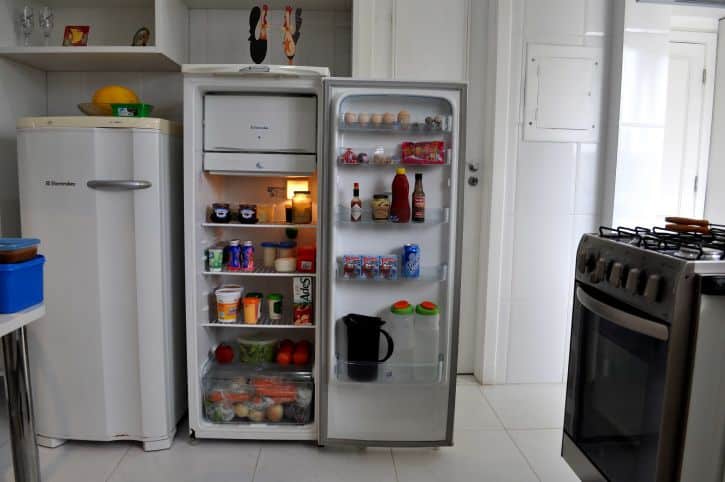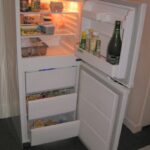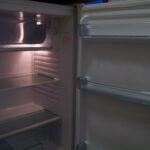Several factors can cause a refrigerator compressor to be hot. An easy way to discover what is causing your refrigerant to be too hot is to attempt to break down the problem into smaller, more manageable problems. After reading this article, you’ll know much more about why a refrigerator compressor gets hot and what are some of the remedies to fix it.
Table of Contents
Refrigerator Compressor Hot: How to Fix it
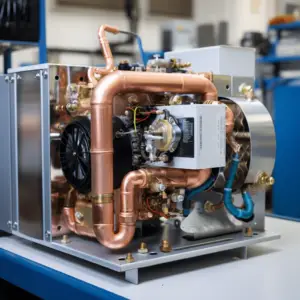
If your refrigerator is hot, there’s a good chance it’s because the compressor is overheating. This is serious and, if not fixed, can lead to permanent damage. Fortunately, there are some easy ways to fix this problem so you can get back to enjoying your cold beverages.
Check for Low Freon Pressure
The first step to take when dealing with a hot refrigerator is to check the freon pressure in the system. If there isn’t enough freon in the system, this will cause the compressor to overheat and shut off. To test this, turn off the power supply to your refrigerator and let it sit overnight without anything running through it. Then turn on the power supply and listen for any buzzing or rattling sounds inside your fridge. If you hear these noises, it means there isn’t enough freon in your system, and you need to replace it with more before trying anything else.
Check the Condenser
One of the most common problems with a refrigerator is a hot compressor. This occurs when the coils inside the refrigerator overheat and shut off. When this happens, it can be caused by one of three things:
- The defrost timer is not set correctly. If you have a frost-free refrigerator, ensure the defrost timer is set, so it goes through a defrost cycle every 24 hours.
- A leaky evaporator coil or ducting has allowed warm air from outside to enter your freezer and coolant lines, which caused them to freeze up, shutting down the compressor.
- The fan motor belt has broken or slipped off its pulley, and no longer pulls air across the evaporator coil (which allows it to cool down).
Clean the condenser Coils
If you’re using a refrigerator over a few years old, it may be time to clean the condenser coils. The condenser coils are located behind the grill on the back of your refrigerator. A metal grill usually covers them with holes cut out that allow airflow.
The purpose of this cleaning is to remove dirt and debris from the condenser coils. This will help improve efficiency and keep your refrigerator running at its best.
Here are some simple steps to follow:
- Turn off the power to your refrigerator before beginning any work.
- Remove the grill on the back of your refrigerator with a screwdriver or other tool. Locate the condenser coils and inspect them for dirt or other debris.
- Use a vacuum cleaner hose attachment with an extension wand on one end and a brush attachment on the other to clean off the dirt inside each coil opening. Don’t use water or any other liquid solution; tap water will work fine here!
Check the Evaporator Coil
If your refrigerator runs hot, the compressor is probably cycling on and off too often. The evaporator coil could be dirty or clogged with dust. Or it may have failed entirely. If you want to fix this problem yourself, here’s how to troubleshoot a hot refrigerator compressor:
-Check the Evaporator Coil
The evaporator coil is the part of your refrigerator that cools down when running. This is where the air comes into contact with the cold coils, which causes moisture in the air to freeze and collect on them.
Eventually, this ice will melt away when the compressor turns off, but if it freezes up too soon, then you’ll have problems with your refrigerator not keeping things cold enough inside.
-Check if your evaporator coil needs cleaning
Turn off your refrigerator’s power source at the circuit breaker or fuse box. If there is one in your home, you can usually find this by flipping off the main switch. If possible, unplug it from an outlet as well for extra safety.
Open up your fridge and remove any shelves blocking access to the appliance’s back. You’ll probably find these at either end of its top shelf. Look behind these shelves for a vertical metal tube going from floor to ceiling just
Inspect the fan
If your refrigerator runs too hot, you may want to check the condenser coils. The condenser is the part of the refrigerator that draws in air from outside and cools it down. The coils may be clogged with dirt or dust if your refrigerator runs too hot. They can also become corroded if they’re exposed to moisture and rust.
When you open a refrigerator door, cold air will rush out. If this happens when no items are inside, the compressor is likely working properly, and there’s nothing wrong with your appliance. However, if you hear a loud noise coming from your refrigerator when you open the door or if it takes longer than usual for cold air to come out of the fridge, then it’s likely that something is wrong with your device.
If your refrigerator has been running hot for more than a few minutes and there are no other signs of trouble like loud noises or unusual sounds coming from inside the appliance, then inspect the fan motor on top of the compressor unit by removing its cover plate and visually inspecting it for signs of damage such as burn marks or frayed wiring.
Monitor the Temperature
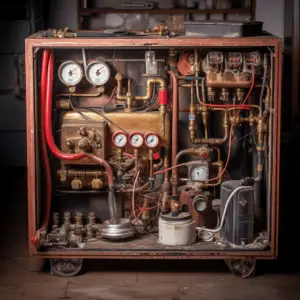
If your refrigerator is running hot, it’s time to take action. Here’s how to fix a hot compressor.
-Check the temperature
The first thing you need to do is check the temperature of your refrigerator. It should be between 34 and 40 degrees Fahrenheit. If it’s too warm, then there are several possible causes:
If you have a self-defrosting model, the defrost cycle might malfunction. Check your owner’s manual for instructions on adjusting or replacing the defroster thermostat if necessary.
If your fridge is freezing things prematurely, ensure that all food has been removed from the freezer compartment before turning off your refrigerator for any period. You should also check the temperature inside your freezer with an accurate thermometer — if it’s not cold enough, less than zero degrees Fahrenheit, it may be time for service.
Final Word
Refrigerators are great appliances, and they are always reliable. Compressor failure is probably the most common fridge problem, though usually, it’s easy to fix. The first thing to do is confirm that the problem is a defective compressor. If it is, fixing the refrigerator is more of a do-it-yourself affair than you might think though it does involve lifting heavy parts.
